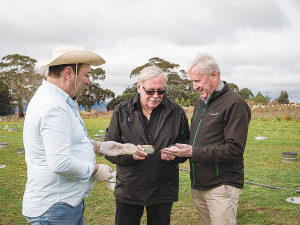Damien O’Connor: NZ united on global trade
When it comes to international trade, politicians from all sides of the aisle are united, says Labour's trade spokesman Damien O'Connor.
 From left, Dr Hosein Alizadeh and Professor John Hampton, Lincoln University and Mike Manning, Ravensdown at the research site.
From left, Dr Hosein Alizadeh and Professor John Hampton, Lincoln University and Mike Manning, Ravensdown at the research site.
A naturally occurring soil fungus is shaping as a new hero to improve nitrogen use on farm.
The fungi that can be applied to soil as either a prill or seed coating is part of a major new research programme launched last month.
N-Vision NZ, led by co-operative Ravensdown and co-funded by the Government’s Sustainable Food and Fibres Future (SFFF) initiative, aims to help farmers reduce nitrogen loss.
One of the projects in the $22 million, sevenyear initiative will harness the power of natural strains of soil fungi to increase the efficiency of nitrogen use by plants.
Ravensdown general manager of innovation and strategy Mike Manning says Lincoln University researchers have discovered natural strains of fungi that reduce the activity of specific microbes, which are involved with nitrogen cycling and losses.
“These nitrogen losses can occur as nitrate leaching through the soil which has potential detrimental effect on waterways, and as nitrous oxide, a potent greenhouse gas emission.
“Although it occurs naturally in pastural soils at a relatively low level, the fungi can be applied to soil as either a prill or seed coating.
"Doing so increases the level of the fungi and therefore alters the nitrogen cycle to reduce nitrogen losses.
“Research to date indicates this has a strong potential to mitigate both greenhouse gas emissions and reduce nitrogen loss to waterways,” he says.
N-Vision NZ includes two other research projects that aim to reduce the environmental impact of New Zealand’s grazed pasture systems: one that will develop an accurate gauge of the nitrogen already in the soil and, therefore enabling farmers to apply more precise quantities of nitrogen fertiliser for optimum plant growth; and another that will research nitrification inhibitors, which have the potential to significantly lower nitrous oxide emissions and nitrogen leaching from grazed pasture systems.
N-Vision NZ will apply leading-edge science and technology to create tools that farmers can use on farm. Importantly farmers will have options to maintain profitability while minimising the environmental impact of their land use.
The Government’s $7.3m contribution to N-Vision supports Ravensdown’s $11m cash contribution, plus in-kind funding. Lincoln University and Plant & Food Research are research partners for N-Vision.
Agriculture Minister Damien O’Connor says the research programme focuses on three technology streams.
N-Retain is a new nitrification inhibitor technology that will look at new ways to block the biological processes in the soil that lead to nitrous oxide emissions and nitrate leaching.
N-Test is a new soil test to inform nitrogen fertiliser decisions on pastoral farms, that will help capitalise on the nitrogen already in soil organic matter. This could mean less nitrogen fertiliser needs to be applied.
The third product, N-Bio Boost, is a fungal bio-inoculant to increase nitrogen use efficiency.
O’Connor says the ag sector needs innovative tools and technologies to help farmers reduce nitrogen fertiliser use on pastoral farms while maintaining production and profitability.
O’Connor said the products and technologies developed through the N-Vision NZ programme will be made widely available under commercial terms.
“This will ensure that the environmental and economic benefits extend to the whole of New Zealand and not just Ravensdown’s customers,” O’Connor says.
Farmer confidence has taken a slight dip according to the final Rabobank rural confidence survey for the year.
Former Agriculture Minister and Otaki farmer Nathan Guy has been appointed New Zealand’s Special Agricultural Trade Envoy (SATE).
Alliance Group has commissioned a new heat pump system at its Mataura processing plant in Southland.
Fonterra has slashed another 50c off its milk price forecast as global milk flows shows no sign of easing.
Meat processors are hopeful that the additional 15% tariff on lamb exports to the US will also come off.
Fears of a serious early drought in Hawke’s Bay have been allayed – for the moment at least.
President Donald Trump’s decision to impose tariffs on imports into the US is doing good things for global trade, according…
Seen a giant cheese roll rolling along Southland’s roads?